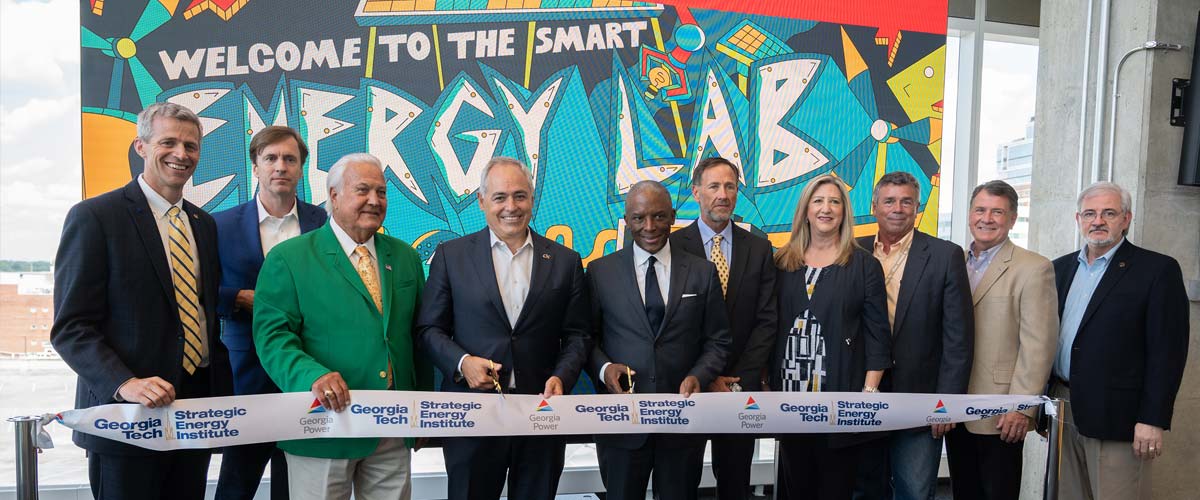As a major economic driver and a champion of job creation in our state, Georgia Tech works to create and support initiatives that foster community enhancements and nurture solid community partnerships. By collaborating with education groups, state agencies, schools, corporations, and opinion leaders throughout the state, we use our resources to increase student success and performance. Whether it’s Covid-19 testing for the General Assembly, outreach within the K-12 sphere, or expert testimony to the U.S. Congress, Georgia Tech continues to be all about community.
Bert Reeves
Vice President, Institute Relations
GTPE Leaders Publish eBook on Covid-19's Impact on Higher Education Globally

GTPE Leaders Publish eBook on Covid-19's Impact on Higher Education Globally
As campuses across the world pivoted to emergency remote learning in response to the Covid-19 pandemic in Spring 2020, leaders in professional and continuing education across the globe found themselves in a remarkable effort to lead, coordinate, and contribute to the remote and online delivery of courses for their respective higher education institutions.
These collective experiences led Georgia Tech Professional Education’s Yakut Gazi and Nelson Baker, associate dean of Learning Systems and dean of Professional Education respectively, to publish an international compilation of responses, adding an important perspective to the ongoing discussion around educational transformation.
The free, open access e-book, released on March 1, 2021, also represents the many who continue to stand ready to participate in and lead a more positive and innovative future for higher education and its function and purpose in serving society.
The work of embracing learner-centric cultural and operational tactics and enabling our students to benefit from accessible, quality learning experiences in a radically affordable manner is just beginning. We look forward to these changes reinvigorating the role of higher education in enabling social achievement, job readiness, and a greater quality life experience.
-Yakut Gazi, Associate Dean of Learning Systems
Virtual Counselor to Help Address Vaccination Hesitancy in Black Communities

The grant is funding the development of a virtual healthcare counselor that answers questions and addresses concerns specifically related to the Covid-19 vaccine. The counselor, known as Clara, is an animated character that simulates face-to-face counseling sessions using verbal and nonverbal communication cues, delivering personally relevant information about the vaccine and engaging users about their specific hesitations about getting the vaccine.
“This intervention is about giving people space where they feel safe and comfortable to explore their questions and concerns around the vaccine,” said Andrea Grimes Parker, co-primary investigator and associate professor of Interactive Computing. “Being in Atlanta and seeing even lower vaccine uptake here, I personally would love to explore adapting the intervention for Georgia.”
The Clara project is a collaboration between Georgia Tech, Northeastern University, the Boston Medical Center, and the Black Ministerial Alliance of Greater Boston TenPoint.
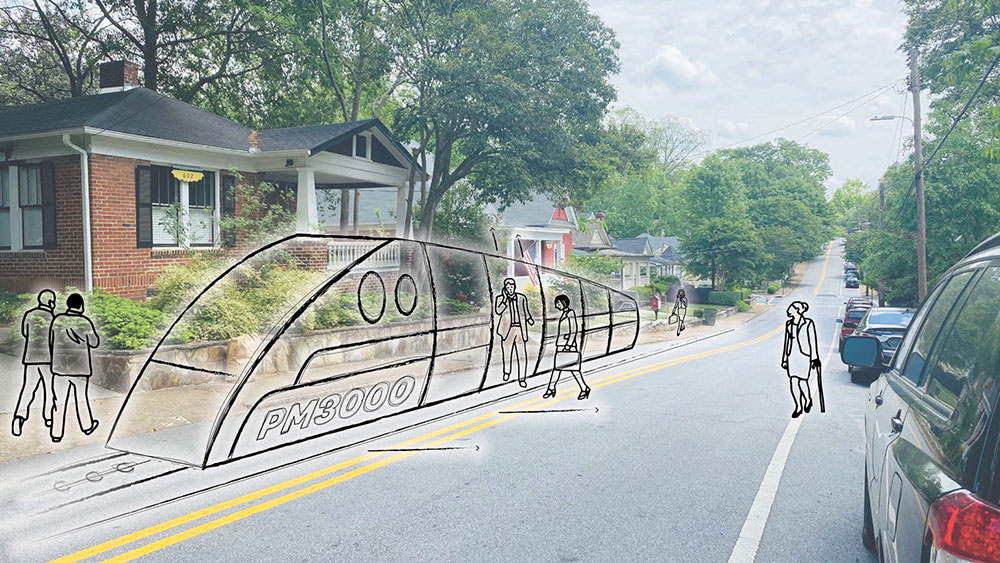
Catherine Ross Tells U.S. House of Representatives: ‘Link Transportation, Housing, and Health for Infrastructure Redesign’
Georgia Tech’s Catherine Ross testified before the U.S. House of Representatives in May 2021 and urged them to link transportation, housing, and health for any future infrastructure redesign.
Ross is director of the Center for Quality Growth and Regional Development and Regents Professor in the School of City and Regional Planning in the College of Design at Georgia Tech. She discussed central issues about transportation and equity in an engaging conversation with members of the House Committee on Appropriations Transportation, and Housing and Urban Development, and Related Agencies Subcommittee.
Ross emphasized the right to mobility in her testimony, stating that approximately 80% of all surface transportation dollars are spent on highways with only 20% on transit. This spending pattern has resulted in reduced mobility and accessibility options for many citizens including those who are older, poorer, or of different ethnicities; those residing in lower-income neighborhoods; students; and persons living in rural and sparsely populated geographies.
Ross imagines an infrastructure that provides access to all — physically and digitally. Her testimony explained the need for greater connectivity including the provision of broadband and digital capacity to communities.
USG Report Shows Georgia Tech’s State Economic Impact Surpasses $4B
Georgia Tech’s economic impact on the state of Georgia in 2020 was $4.01 billion, according to an annual report that provides impact breakdowns for all University System of Georgia (USG) colleges and universities. That figure is up more than $1 billion from Georgia Tech’s 2015 fiscal year economic impact of $2.87 billion.
Georgia Tech’s impact tops the list of all USG schools — more than a billion dollars more in economic impact than any other school in the system. The report also calculated value-added economic impact, which signifies the specific benefits reaped by the businesses and households in an immediate region. For Georgia Tech, the value added to the Atlanta metro area was $2.78 billion.
The report also found that the USG system, directly and indirectly, generated 155,010 jobs in the state of Georgia, aligning well with the Institute’s strategic plan objective of amplifying impact by showcasing Georgia Tech’s strength across the state.

Forum Addresses Inclusive Entrepreneurship
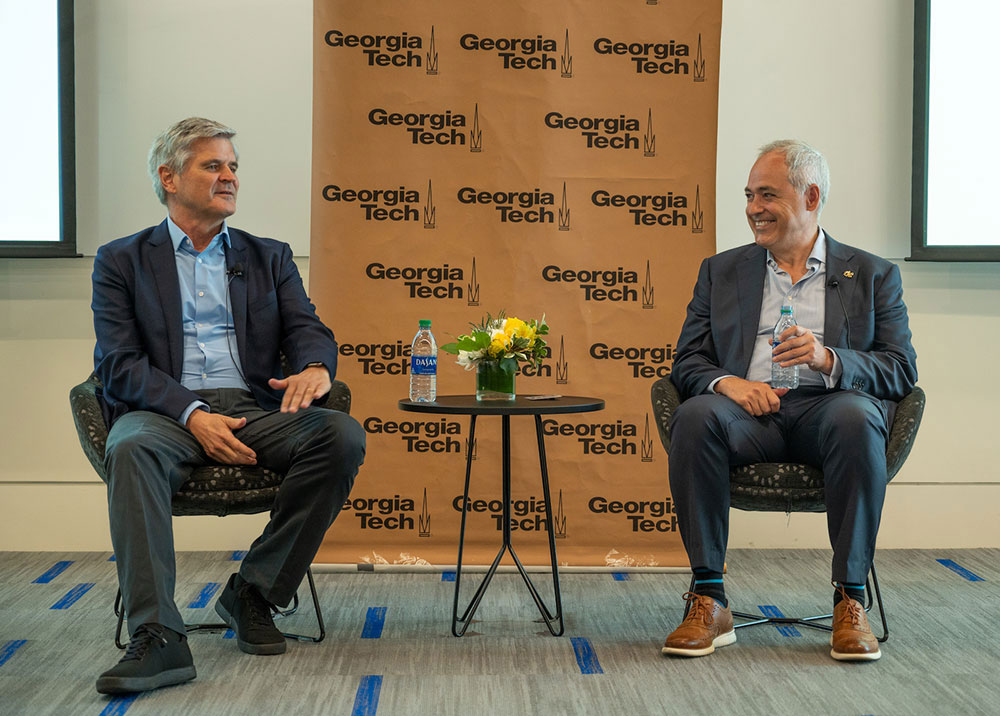
Forum Addresses Inclusive Entrepreneurship
At the forum, President Ángel Cabrera held a fireside chat with Steve Case, co-founder of AOL and investment firm Revolution LLC.
Case said Atlanta is well positioned and has an opportunity to emerge as the most inclusive startup city by “creating an environment where everybody has a shot.” Because of the diversity of Atlanta itself, Case said the city has an advantage in this area, and he urged attendees to seize the moment. While encouraged by the changes he has seen, Case said there is still a lot of work to be done. He said Atlanta’s success will depend on three things: talent, capital, and collaboration.
The forum included discussions on diversity and inclusion with panels of community leaders, Tech alumni and students, young entrepreneurs, business and financial leaders, and Tech faculty and staff. Panelists discussed what companies should and should not do regarding inclusion. They also talked about how diverse teams contribute to higher profits because they uncover problems that others do not.
Read the white paper Dialogues on Inclusive Entrepreneurship (PDF) that resulted from the daylong event.
Margulies Appointed to Lead NSF Engineering Directorate
She is the first biomedical engineer to head the directorate, which supports fundamental research, enhances the nation’s innovation through a range of initiatives, and is a driving force behind the training and development of the United States’ engineering workforce.
“The opportunity to serve the NSF resonates with my values — catalyzing impact through innovation, rigor, partnership, and inclusion. It’s an irresistible invitation, and it has to be to pull me away from my Coulter BME family,” Margulies said. As professor and chair of the Wallace H. Coulter Department of Biomedical Engineering, she diligently worked to increase access and diversity and worked to build a deeper sense of community. “I’m so proud to have worked alongside this unmatched group of students, staff, and faculty in our shared drive to improve health and well-being.”
She will remain a member of the faculties at Georgia Tech and Emory University.

Blue HR Section Div
Georgia Tech’s InVenture Prize Wins Southeast Emmy Award

Affectionately described as “American Idol for nerds,” the Georgia Tech InVenture Prize began in 2009 with one singular focus: to celebrate the Institute’s top student inventors in the hopes of inspiring creativity, innovation, and entrepreneurship among the broader student body.
Over the past 13 years, it has become an Emmy Award-winning, nationally recognized brand, receiving media attention from CNN to the Associated Press. The 2021 win was the fifth such victory for the InVenture Prize. The success of the Georgia Tech InVenture Prize has spawned multiple competitions such as the K-12 InVenture Prize, which boasts more than 4,000 K-12 students in Georgia participating annually, as well as the ACC InVenture Prize, a multiuniversity competition among all the member institutions of the Atlantic Coast Conference.
Broadcast live on numerous PBS affiliates along the Eastern Seaboard, the InVenture Prize is reputed for showcasing students’ problem-solving abilities and technical know-how, and has cemented itself as a solid conduit to innovation and entrepreneurship.
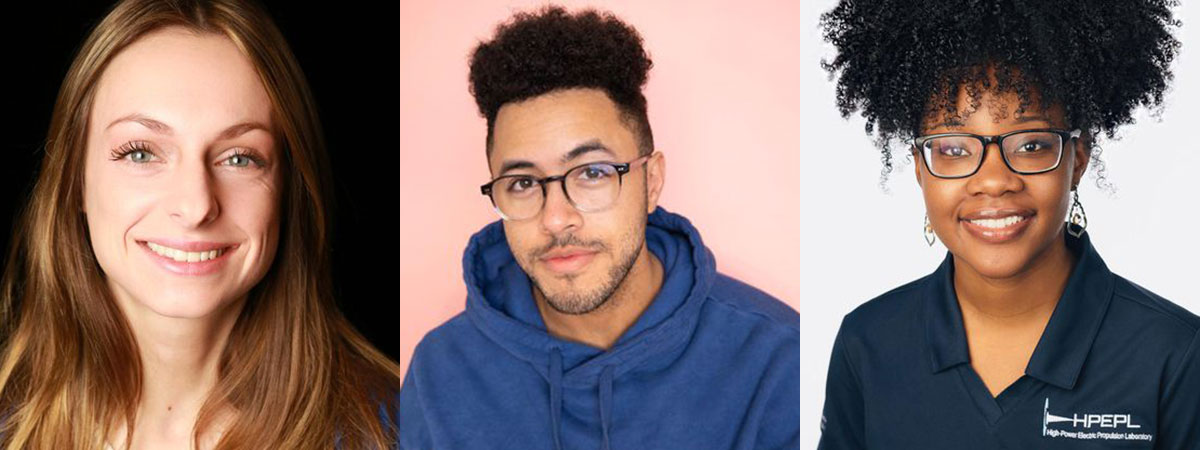
Forbes 30 Under 30
Each year, Forbes receives more than 15,000 nominations for its esteemed “30 Under 30” list. For 2021, eight Yellow Jackets made the list. Six were alumni:
- Renji Bijoy, a 2016 computer science master’s graduate, founded Immersed, a software company that has partnered with Facebook to build virtual reality offices.
- Anhong Guo earned his Master of Science in Human-Computer Interaction in 2014. He was recognized for his research combining human and artificial intelligence to make visual information more accessible to the visually impaired.
- Jarvis Johnson (above center) graduated in 2014 with a computer science degree and was a software engineer at Yelp and Patreon before becoming a professional YouTuber, dealing with wide-ranging issues from entertainment to mental health, and attracting more than 1.5 million subscribers.
- Emily Parrish (above left) majored in industrial engineering, with a minor in engineering and business, and graduated in 2016. Forbes recognized her for her work as a senior robotics hardware development engineer at Amazon where, in 2019, she deployed a new item sortation machine, yielding savings of $4 million a year.
- Leonard Robinson graduated with his master’s degree in electrical and computer engineering in 2016 and is now the lead manufacturing engineer at Cytiva, determining shop floor execution for clinical trials and training technologists. He has also developed tests to ensure steady delivery of Covid-19 solutions.
- Max Jordan Nguemeni Tiako, a 2015 master’s bioengineering graduate, is focused on health equity, marginalized populations, and racism in healthcare. He credits his support system and the Black community at Tech for helping guide him along his path.
A current student also made the list: Naia Butler-Craig (above right), a Ph.D. student in the Daniel Guggenheim School of Aerospace Engineering. Her research focuses on increasing the performance and efficiency of electric propulsion devices.
A current faculty member was featured, as well: Diyi Yang is an assistant professor in the School of Interactive Computing, where she directs the Social and Language Technologies Lab, conducting research in computational social science and natural language processing.
Ivan Allen College of Liberal Arts and the College of Computing Launch New Ethics Center
The College of Computing and the Ivan Allen College of Liberal Arts have launched the Ethics, Technology, and Human Interaction Center (ETHICx).
The new Center — pronounced “ethics” — will advance ethics-in-technology research, education, and engagement at Georgia Tech, in collaboration with communities, government, nongovernmental organizations, and industry.
“We must foster Georgia Tech’s strengths in ethics, responsible research, and the development of emerging technologies in collaborative ways,” said Raheem Beyah, dean in the College of Engineering, who provided funding for ETHICx while serving as vice president for Interdisciplinary Research. “ETHICx will provide the necessary environment to support this work and Georgia Tech’s mission to advance technology and improve the human condition.”
Both Colleges have extensive experience in this arena. In Ivan Allen, the School of Public Policy founded the Center for Ethics and Technology more than 12 years ago to foster a critical inquiry culture and deliberation about technology-related ethical issues. The College of Computing has created thriving research and educational initiatives such as the Ethical AI professional development course and the Law, Policy, and Ethics Initiative for Machine Learning @ GATECH.
ETHICx will build on those strengths and position Tech to become the leader in framing ethical concerns in technology, including fairness, accountability, transparency, social justice, and technological change.
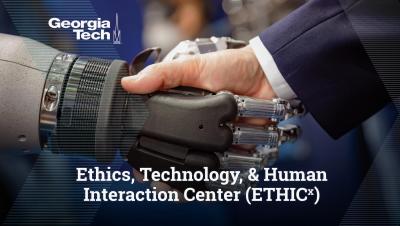
We must foster Georgia Tech’s strengths in ethics, responsible research, and the development of emerging technologies in collaborative ways. ETHICx will provide the necessary environment to support this work and Georgia Tech’s mission to advance technology and improve the human condition.
-Raheem Beyah, Dean in the College of Engineering
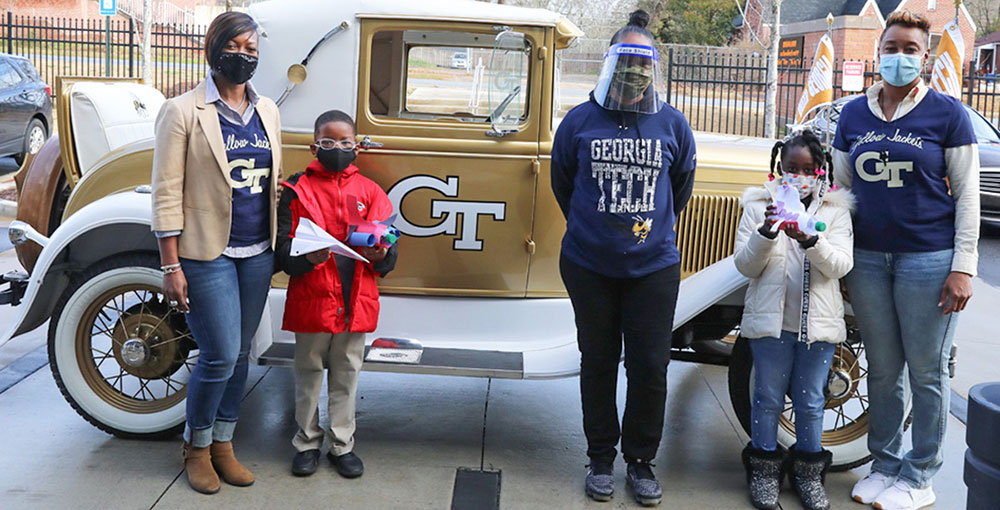
Partnering in STEM
At the height of the pandemic, students of all ages were learning virtually, many struggling to stay engaged. With this in mind, and in keeping with Georgia Tech’s mission to expand access to STEM education, leadership from Georgia Tech’s School of Aerospace Engineering met with Atlanta Public Schools officials and asked, “How can we help?”
What happened next was the creation of a new partnership between the School and the Tuskegee Airmen Global Academy. The partnership focuses on K-12 curriculum and resources provided by the AE School and the Georgia Space Grant Consortium, featuring aerospace fundamentals that can be easily grasped by young students. The partnership has an even deeper connection for the School's associate chair and Georgia Space Grant Consortium Director Stephen Ruffin.
“My father, Spaulding Ruffin, was a Tuskegee Airman, so when we connected with the Academy, it felt like I was helping to fulfill some of his mission,” said Ruffin. “He would have been thrilled with what we are doing through the partnership and that I can play a role in that.”
To date, the partnership has enabled the Academy’s students to learn the engineering design process, aerospace fundamentals, and about possible career opportunities in the field of engineering.
Making Space for Black Tech
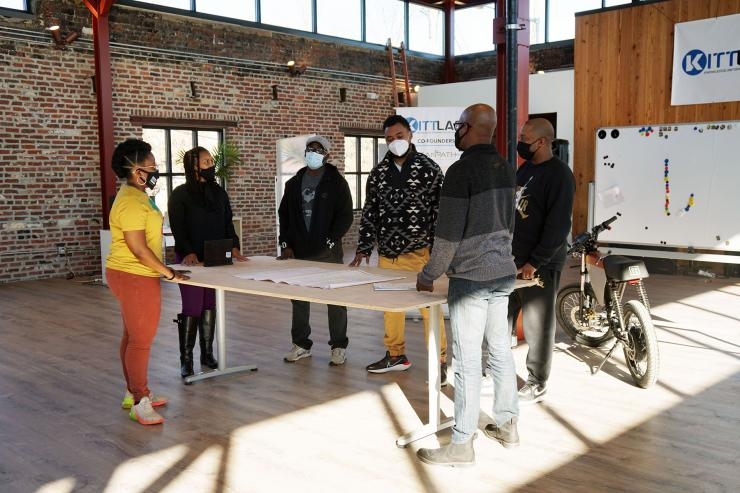
At the beginning of 2020, a group of Black alumni from the School of Electrical and Computer Engineering created a space for minority tech talent to meet, learn, and collaborate. KITT Labs — which stands for knowledge, information, technology, and tools — was co-founded by LaVonda Brown, Troy Nunnally, Nashlie Sephus, and Ivan Walker.
The goal was to bring Black tech talent together under two main pillars: access to resources and opportunities for collaboration. Sephus defines the space as a “co-development studio founded by Black technologists to assist the community with opportunities in science, technology, engineering, art, and math.”
The 5,855-square-foot converted warehouse overlooks the Westside Trail of the Atlanta BeltLine and provides resources like hot desks, private offices, 3D printers, an electronics lab, a photo and video studio, a podcast recording studio, and event space. But the most important resource at KITT Labs is the network of talent.
Membership at KITT Labs is open to anyone and everyone, and it is growing exponentially. Within the next few years, the co-founders hope to expand to additional campuses throughout the country and, eventually, the world.
Virtually Hosting High School Students
Georgia Tech continuously seeks new opportunities to lead by example and equip future technology leaders with the necessary skills to tackle the world's greatest challenges. Such an approach was on full display in Summer 2020, when STEM@GTRI – the Georgia Tech Research Institute (GTRI) educational outreach program designed to inspire, engage, and impact educators and students in the fields of science, technology, engineering, and math (STEM) – held its first virtual High School Internship Program.
The event, which lasted five weeks and was held virtually due to Covid-19, included 55 students across Georgia who were selected from an application pool of over 400, and 26 GTRI professionals from across seven of the eight GTRI labs.
The students and GTRI researchers worked closely on several virtual projects – from programming a robotic arm and coding responses for a virtual assistant for senior citizens, to perfecting a tabletop wind tunnel and learning the ins and outs of natural-language processing technologies. Throughout the experience, students learned not only a variety of technical skills in the areas of coding, robots, data science, and cybersecurity, but also about the importance of developing and cultivating mentorships early on.
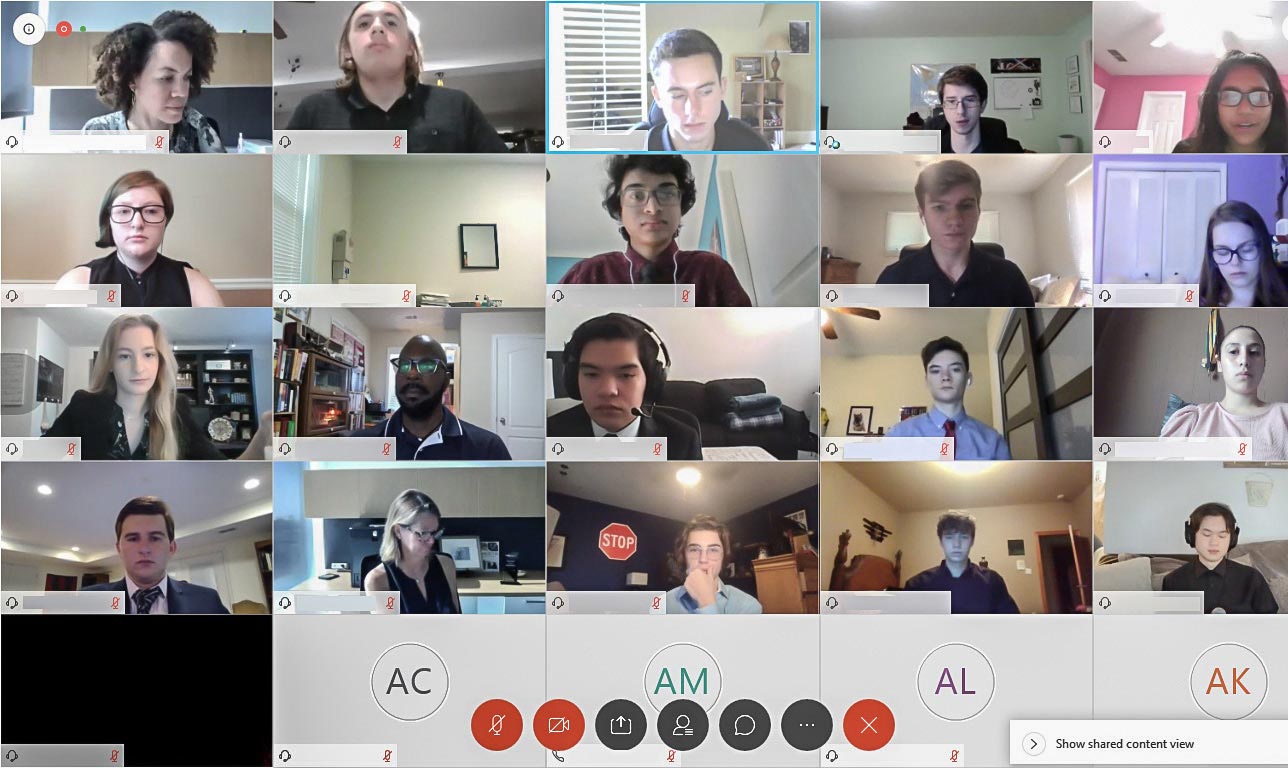
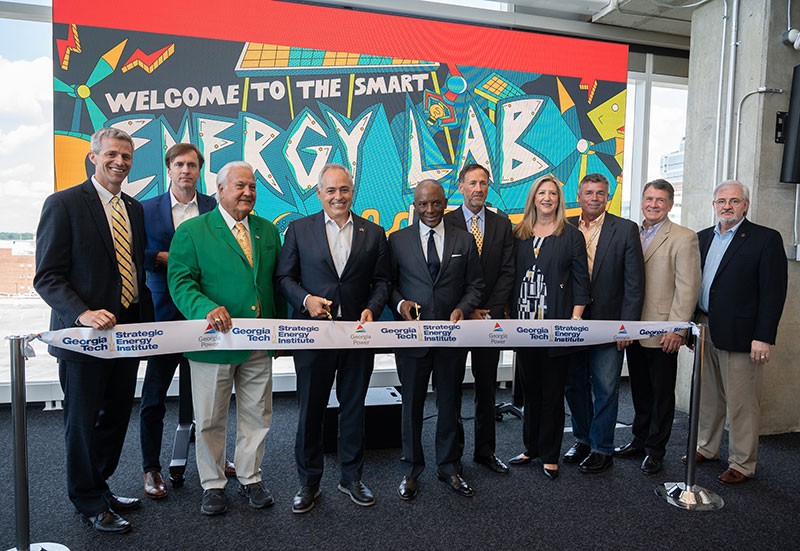
Georgia Tech Celebrates Opening of New Energy Project in Midtown Atlanta
Through a longstanding partnership between Georgia Power and Georgia Tech, a 1.4-megawatt microgrid is now located at Spring and Fifth Streets in Atlanta. The project will help power the larger local grid in Midtown, while minimizing environmental impact.
Microgrids are self-contained power systems, co-located with the facilities they serve, that include generation resources, storage systems, and energy management systems. The Tech Square Microgrid, which was approved by the Georgia Public Service Commission, is being used to evaluate how a microgrid can effectively integrate into and operate as part of the overall electrical grid. The facility will not only provide clean power to Midtown, it will also serve as a living laboratory in which Georgia Tech, industry, and government researchers will work collaboratively to create the next generation of clean energy solutions.
Georgia Tech is committed to addressing the most consequential challenges of our time. That involves advancing science and technology, developing leaders who can create and deploy new solutions, and leading by example with our own practices. This microgrid is a great illustration of the latter. In our partnership with Georgia Power and the Georgia Public Service Commission, we will be developing and adopting some of the most advanced, efficient, and responsible energy solutions available, in the hope we can serve as an example for others.
-Georgia Tech President Ángel Cabrera
First Georgia Tech Students Join U.S. Space Force
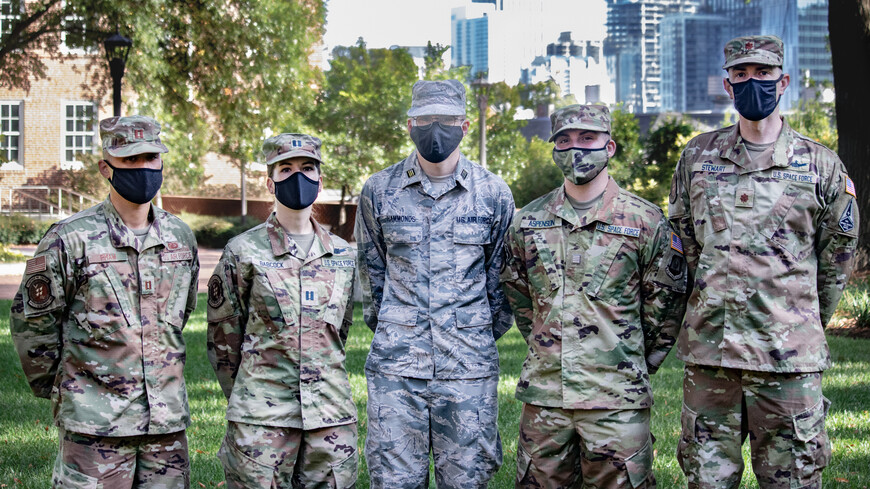
Two military officers pursuing degrees at Georgia Tech became among the first students here to transfer to the U.S. Space Force, followed by ROTC cadets who more recently joined the new service.
Capt. Chloe Babcock, an instructor in Georgia Tech’s Air Force ROTC Detachment 165 and a master’s student in the H. Milton Stewart School of Industrial and Systems Engineering, transferred to the Space Force in September 2020.
A month later, Maj. Brian Stewart, who is working toward a doctoral degree in the Sam Nunn School of International Affairs, also transferred to the Space Force from the Air Force. He will teach at the U.S. Air Force Academy after completing his studies.
Additionally, three ROTC cadets from Georgia Tech have been commissioned into the Air Force, with plans to transfer to the Space Force this year. Melody Marshall Wolfson, AE 2020, and John Willingham, AE 2021, commissioned into the Air Force after graduation and joined the Space Force in May. Joshua Hammonds, ME 2020, commissioned into the Air Force and is scheduled to join the Space Force in November.
“As an engineering student at Georgia Tech, I've been trained for the past five years specifically to solve large problems. I think joining the Space Force will give me the opportunity to do that,” Hammonds said.
Tech Commended by Georgia General Assembly for Providing Covid-19 Surveillance Testing During Full 2021 Legislative Session
In the wake of the Covid-19 pandemic, research faculty from Georgia Tech and the Georgia Tech Research Institute developed an innovative saliva-based Covid-19 testing program to keep their students and campus community safe. The same procedure was used to test the Georgia General Assembly.
Both the House and Senate passed resolutions applauding this effort and credited the Georgia Tech testing team for enabling them to complete the session safely.
“This ties into many aspects of Georgia Tech’s strategic plan,” said Vice President for Institute Relations Bert Reeves, “but especially amplifying impact and championing innovation. Without Georgia Tech’s innovation that produced efficient and effective testing, our lawmakers wouldn’t have been able to focus and complete the state’s business – namely, passing the next fiscal year budget which impacts all Georgians.
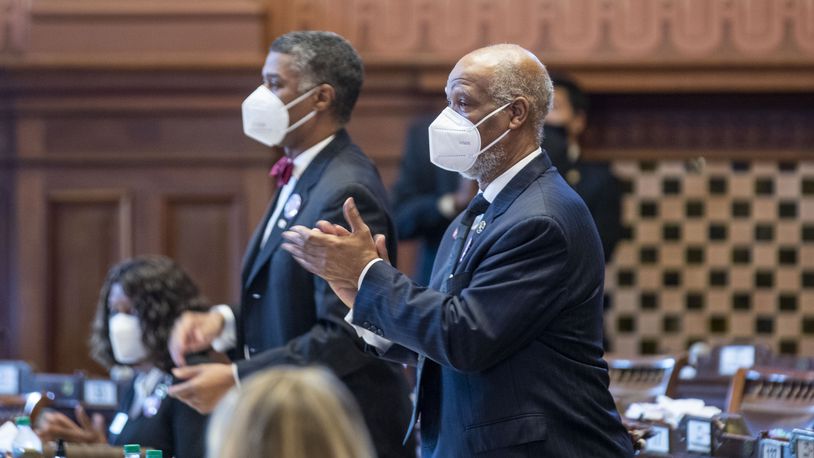
Institute Relations Partnered with SGA Leadership to Turn McCamish Pavilion Into Polling Precinct Staffed With Student Poll Workers

When Georgia Tech’s Student Center began undergoing extensive renovation, international relations major Samuel Ellis wondered where students on campus would vote. His proposal: Turn McCamish Pavilion into a polling precinct and staff it completely with Georgia Tech students. When Ellis put out a call for 12 poll volunteers, he received more than 250 replies. So, not only was the polling location at McCamish Pavilion staffed by students, but those extra volunteers were trained to troubleshoot issues with the electronic ballot machines and were dispatched across the state as technicians to support precincts with technological issues on Election Day.
While this endeavor certainly aligns with expanding access, it also speaks to the focus of leading by example. The opportunity to support a student’s vision of leading by example resulted in widespread voter education for campus and the community at large. In addition, it opened the door for other students to volunteer and live out a most important act of public service as a poll worker.
-Morgan McCombs, Georgia Tech’s Director of State Relations
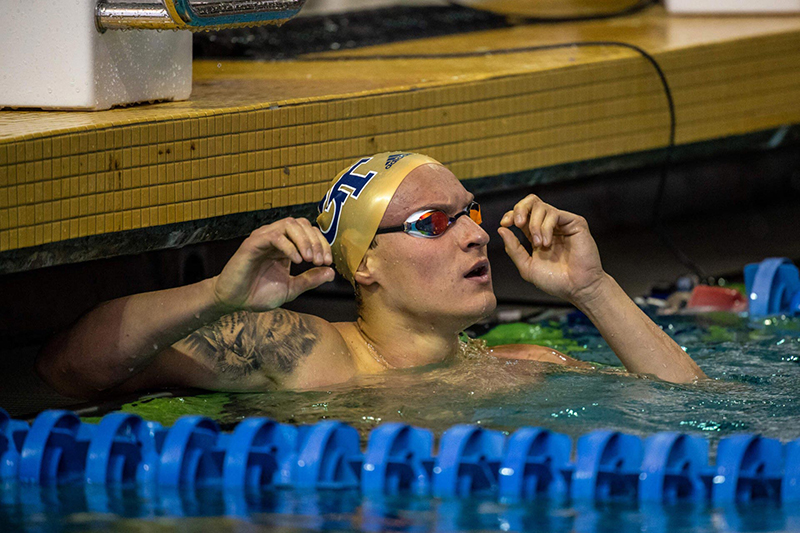
Georgia Tech at the 2020 Tokyo Olympics
Two current student-athletes, two incoming first-year students, three former student-athletes, and two alumni tapped to coach were among the Georgia Tech Yellow Jackets who participated in the 2020 Summer Olympics in Tokyo. The nine athletes who traveled to Tokyo represented six countries located on five continents.
In addition, two Yellow Jackets served as flagbearers during the opening ceremony: Incoming first-year student-athlete and swimmer Berke Saka carried the flag for Turkey, and Andrew Chetcuti, a 2016 biology graduate, was flagbearer for his nation of Malta.
Georgia Tech and the Olympics have had strong ties for decades: 25 years ago, Tech's campus served as the heart of Olympic Village — where athletes lived, journalists reported, and visitors from around the world gathered for the 1996 Atlanta Olympic Games when Tech also served as the venue for swimming, diving, synchronized swimming, water polo, modern pentathlon, boxing, and Paralympic volleyball.

